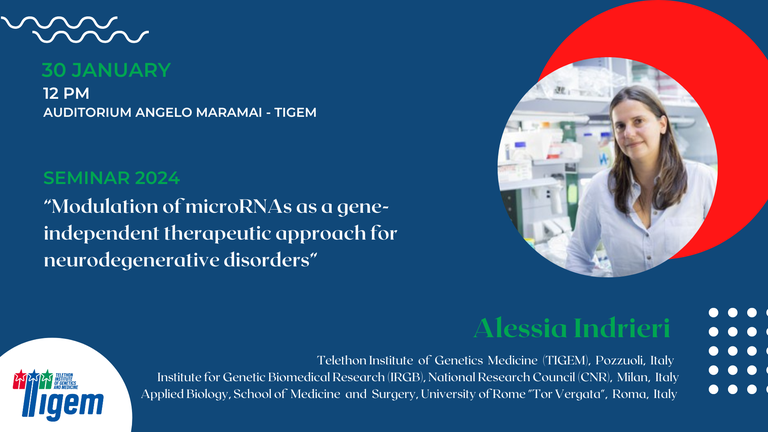Alessia Indrieri, PhD - "Modulation of microRNAs as a gene-independent therapeutic approach for neurodegenerative disorders"
- When Jan 30, 2024 from 12:00 PM to 01:15 PM (Europe/Berlin / UTC100)
- Where Tigem Auditorium Angelo Maramai
- Contact Name Alessia Indrieri
- Contact Phone 08119230659
-
Add event to calendar
iCal

- https://www.tigem.it/newsroom/seminars/alessia-indrieri-phd-modulation-of-micrornas-as-a-gene-independent-therapeutic-approach-for-neurodegenerative-disorders
- Alessia Indrieri, PhD - "Modulation of microRNAs as a gene-independent therapeutic approach for neurodegenerative disorders"
- 2024-01-30T12:00:00+01:00
- 2024-01-30T13:15:00+01:00
Alessia Indrieri, PhD
Telethon Institute of Genetics Medicine (TIGEM), Pozzuoli, Italy
Institute for Genetic Biomedical Research (IRGB), National Research Council (CNR), Milan, Italy
Applied Biology, School of Medicine and Surgery, University of Rome "Tor Vergata", Roma, Italy
Short CV
Abstract
Mitochondrial dysfunction underlies the pathogenesis of various neurodegenerative diseases (NDs), either directly, as in the case of mitochondrial diseases (MDs), or indirectly, as in other monogenic conditions (e.g., other Inherited Retinal Diseases, IRDs), and complex multifactorial disorders (e.g., Glaucoma and Parkinson's disease).
Despite a vast amount of research these pathologies are still only treated symptomatically, and, in this respect, mitochondria could represent the common denominator and hence a promising therapeutic target. We recently demonstrated that the microRNAs miR-181a and miR-181b (miR-181a/b) regulate key genes involved in mitochondrial biogenesis function and clearance. We also show that these miRNAs are involved in the global regulation of mitochondrial turnover in the central nervous system (CNS) through the coordination of mitochondrial biogenesis and mitophagy. Interestingly miR-181a/b downregulation protects neurons from cell death and ameliorates the disease phenotype in different in vivo models of MDs.
In this talk, I will present an adeno-associated viral (AAV)-mediated miRNA-based approach that we have developed as a novel gene-independent therapeutic strategy for the treatment of rare and common mitochondrial-associated disorders. I will also show data regarding its therapeutic efficacy in models of MDs and IRDs, as well as in more complex multifactorial disorders such as Glaucoma and Parkinson's disease.
Telethon Institute of Genetics Medicine (TIGEM), Pozzuoli, Italy
Institute for Genetic Biomedical Research (IRGB), National Research Council (CNR), Milan, Italy
Applied Biology, School of Medicine and Surgery, University of Rome "Tor Vergata", Roma, Italy
Short CV
Abstract
Mitochondrial dysfunction underlies the pathogenesis of various neurodegenerative diseases (NDs), either directly, as in the case of mitochondrial diseases (MDs), or indirectly, as in other monogenic conditions (e.g., other Inherited Retinal Diseases, IRDs), and complex multifactorial disorders (e.g., Glaucoma and Parkinson's disease).
Despite a vast amount of research these pathologies are still only treated symptomatically, and, in this respect, mitochondria could represent the common denominator and hence a promising therapeutic target. We recently demonstrated that the microRNAs miR-181a and miR-181b (miR-181a/b) regulate key genes involved in mitochondrial biogenesis function and clearance. We also show that these miRNAs are involved in the global regulation of mitochondrial turnover in the central nervous system (CNS) through the coordination of mitochondrial biogenesis and mitophagy. Interestingly miR-181a/b downregulation protects neurons from cell death and ameliorates the disease phenotype in different in vivo models of MDs.
In this talk, I will present an adeno-associated viral (AAV)-mediated miRNA-based approach that we have developed as a novel gene-independent therapeutic strategy for the treatment of rare and common mitochondrial-associated disorders. I will also show data regarding its therapeutic efficacy in models of MDs and IRDs, as well as in more complex multifactorial disorders such as Glaucoma and Parkinson's disease.
